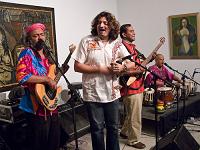
Download For 20 years the Delhi based band Indian Ocean has been setting the pace for crossover music in India.
With a mix of Indian classical music, fusion and jazz-rock they continue to attract both young and old.
Our reporter Ric Wasserman caught up with them at a recent performance in Stockholm, Sweden and he sent this report.
The group started off classically enough -- with a love for classical Indian music. Rahul Ram, the bassist, explains.
t began with Sushmit the guitar player and Assim the tabla player and vocalist. Sushmit played a different type of guitar when he was in second year of college, influenced by Indian classical music. And so he made a few skeletal compositions. Sushmit and Assam sat down and started adding a rhythmic structure to these skeletal compositions. Around 1990 they actually went ahead and formed a band.
The band would go on to become the wildly popular group Indian Ocean, with Rahul Ram on the bass, Susmit Sen on guitar, Amit Kilam on drums, percussion, and wind instruments, Himanshu Joshi on vocals and Tuhen on tablas.
The British HMV music label signed the band in 1991 and their first album sold 40, 000 copies - the highest selling record out of India up to that time.
Ram says it’s the sound of the guitar that makes the band distinctively Indian.
"The guitar has a very unique sound in Indian Ocean. It sounds like a sarod sometimes. Its not chord based, its scale based and that instinctively makes it sound more indian."
But it isn’t just the guitar that makes Indian Ocean’s sound unique. Amit Kilam joined the group four years ago bringing with him a new type of instrument - flutes. He says that all the members of Indian Ocean strive to push the boundaries with all their instruments.
"You’re not bound by the structure that instrument imposes upon you just because an instrument is played in a particular manner. You’d find us happily jumping out of the the regular way of dealing with the instrument. It’s more soundscapeing. I remember at the beginning I was trying to fill in lots of sounds."
With a wide variety of instruments and sounds, Indian Ocean prides itself on creating not just a unique musical product, but also a unique process.
This playfulness and willingness to take risks is one of the keys to Indian Ocean’s success.
In middle of a song, tabla player Tuhan kneels down in front of the bass player and begins to tap out a rhythm on the strings. The other musicians catch the direction he’s going in, and fill in the sound.
It may seem spontaneous, but it’s part of a larger collective decision.
Bassist Rahul Ram explains that the music evolves as part of a democratic process - they build the song with layers of intricate melodic lines, often changing rhythms mid song.
"Actually, when we make a song it happens as a jam. It could be anything. It could be a drum pattern, could be a guitar line, vocal line, tabla rhythm, bass line...anything...then you see it evolves by itself. Because there is no leader, there’s no one person telling you what to do, so it evolves by consensus. In our case that seems to work well."
Ram’s the frontman of the group - but he isn’t the main vocalist.
He’s the bassist.
For many Indian listeners, that’s hard to understand. Kilam says that in India people expect the singer to be at the forefront. And the singers should have perfect pronunciation.
When somebody’s singing usually you like to listen to exactly what he’s saying and the nuances of the word and the exact feel of the word. In India at least the vocals are revered to an obnoxious degree. Everyone wants to listen to the vocalist for some bizarre reason. Each and every grain of his vocals should be great. But we don’t like that kind of mix.
Indian Ocean gives everyone a voice - the bass, flute, and the drum get their chance in the spotlight as well.
And while Indian Ocean is known to be playful, they’re also deeply involved in social issues. Amit Kilam says the songs have deeper meanings, often related to their native country of India.
"The compositions are not frivolous. There is a certain amount of gravity that is there. And that gravity comes with understanding things around you. Being part of larger issues."
An example is the song ”Bandeh” Indian Ocean wrote for the popular Bollywood film Black Friday: it's a cold look at the Mumbai bombings and ethnic turmoil in 1993, and a plea for peace.
But most of all, the music makes people want to dance. After more than two hours of nonstop jamming at a recent concert in November the band packs up. The elated audience trudges out of the theater into the snowy Stockholm night.
Devi Patel from India says the music took her on a journey - back to the Indian Ocean.
"It was fabulous and in this weather, such cold weather and we’re enjoying the show from the beginning to the end its like I’m in India. So I’m feeling back home."










